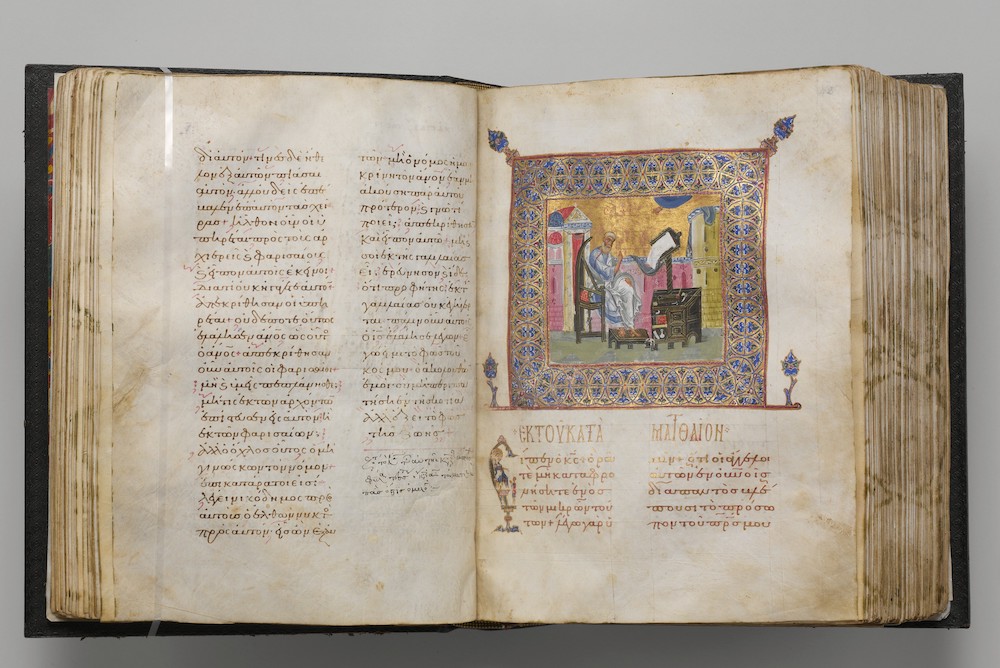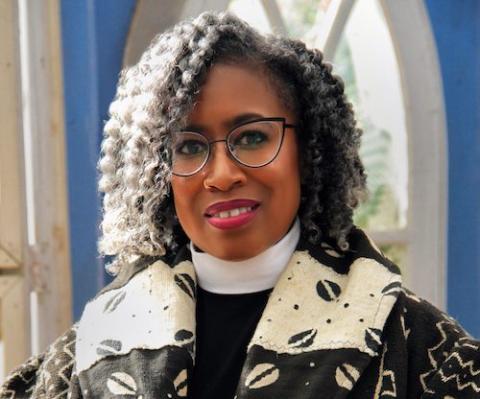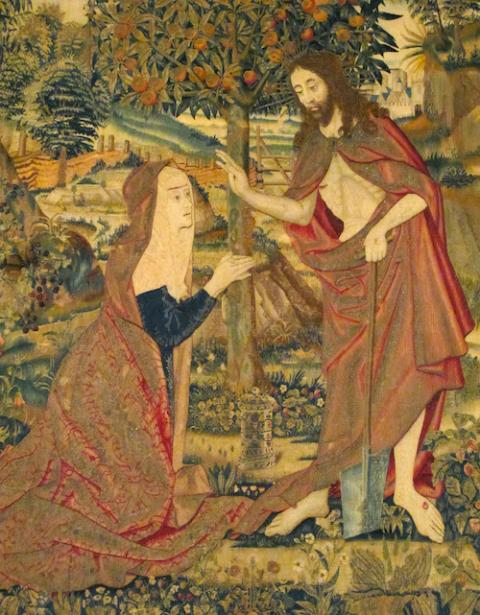
Jaharis Byzantine Lectionary, circa 1100 and made in Constantinople, open to folio 43 showing the evangelist Matthew (Metropolitan Museum of Art)
My ears perked up last week when I learned that Pope Francis had authorized a "visitation" at the Congregation for Divine Worship and the Discipline of the Sacraments following the recent retirement of that office's prefect, Cardinal Robert Sarah.
I couldn't agree more with Jesuit Fr. Tom Reese's opinion that this office "has done little to support badly needed liturgical reform."
But it is not for want of trying on the part of reform-minded Catholics.
In 2008 a two-year campaign supported by nearly 20,000 Catholics worldwide asked the Synod of Bishops on the Word of God to restore biblical women leaders to lectionary texts from which their witness had been diminished or deleted. Full disclosure: I helped spearhead this campaign and was in Rome during the synod, albeit watching around the edges. Here are a few examples first identified by Benedictine Sr. Ruth Fox that we shared with synod bishops:
- It is well known that Jesus' women disciples, led by Mary Magdalene, were the first witnesses to the resurrection. Easter Sunday's Gospel in the U.S. lectionary (#42), however, stops just at the point of the beautiful story of Jesus' appearance to Mary Magdalene in the garden and his important apostolic commission to her: "Go to my brothers and tell them ..." (John 20:17)
- The story of two brave Hebrew midwives, Shiphrah and Puah, is deleted from the lectionary reading describing the enslavement of Israel. The weekday reading of Exodus 1:8-22 (Lectionary #389, Monday of the Fifteenth Week in Ordinary Time, Year I) skips from verse 14 to verse 22, thus eliminating the story of these valiant women who put their own lives at risk to uphold God's law of life.
- Many Catholics mistakenly believe St. Paul was anti-women. Yet, as Pope Benedict XVI himself said so well, St. Paul worked closely with women leaders such as Phoebe, Junia, Lydia and Prisca. Unfortunately, Romans 16, a passage that names 11 women and identifies some as deacons, apostles and co-workers, is never proclaimed on a Sunday. As a result, most Catholics never hear about these women's important ministry alongside Paul.
This underrepresentation of faithful women leaders creates significant pastoral challenges to evangelizing 21st-century women and men who are accustomed to seeing women serving in professional and corporate leadership roles.
To address these pressing pastoral issues, an online Comprehensive Catholic Lectionary has been created by Jane Via and Nancy Corran, who are Roman Catholic Womenpriests, for the independent Mary Magdalene the Apostle community in San Diego. It is supported by the Women's Ordination Conference.
Thankfully our Protestant sisters are also creating impressive lectionary resources featuring biblical women.
The Rev. Wil Gafney, an Episcopal priest and professor of Hebrew Bible at Brite Divinity School, in Fort Worth, Texas, spent the past two years developing Year A and Year W of A Woman's Lectionary. * (See also #womenslectionary on Facebook). In an emailed excerpt from the project summary, Gafney wrote:
The completed Lectionary will consist of a traditional three-year cycle with the familiar corresponding gospels common to the Episcopal and Revised Common Lectionaries and, a stand-alone year "W," drawing on all four gospels. All four years center texts that focus on, feature and, occasionally occlude, women and girls.

The Rev. Wil Gafney, Episcopal priest and professor of Hebrew Bible at Brite Divinity School, Fort Worth, Texas (Courtesy of Wil Gafney)
She involved 63 "conversation partners" from 14 English-speaking denominations around the world and intentionally "held a specific session for queer-identifying and non-binary readers and hearers of the text focusing on the use and implications of binary language, even in service to womanist/feminist work, in an increasingly post-binary world." Gafney's lectionary is expected to be published in July. She is also the featured online speaker for FutureChurch's July 29 Women Erased program.
In addition, Ashley M. Wilcox is a Quaker minister who created The Women's Lectionary scheduled for publication in August. Her resource focuses on feminine imagery for God, passages about women in the Bible, and "reimagines the liturgical calendar of preaching for one year."
But back to the efforts of reform-minded Catholics to influence the hierarchy at the 2008 synod on the Word:
Prior to the synod, packets of materials containing extensive documentation of lectionary omissions or deletions of biblical women leaders were sent to 25 English-speaking bishop delegates from the U.S., the U.K., Ireland, Australia, the Philippines, Canada, India and Africa.
Judging from the responses I received from many prelates at the time, most had no idea that the stories of biblical women leaders had been sliced out of lectionary texts, and frankly, were somewhat embarrassed about it.
As a result, Australia's Bishop Michael Putney told me that "a number" of the bishops' small working groups had in fact discussed lectionary issues, even though they were not expected to be addressed. The bishops went on to pass Proposition 16, which recommended "that an examination of the Roman lectionary be opened to see if the actual selection and ordering of the reading are truly adequate to the mission of the Church in this historic moment."
Sadly — despite a vigorous follow up campaign — Proposition 16 went nowhere.
Advertisement
Now that Francis has asked that the work of the Congregation for Divine Worship and the Discipline of the Sacraments be evaluated, I dare to hope that "examining the Roman lectionary" will receive the attention it deserves.
Already Catholic priests in the U.K. and Ireland are expressing outrage at a decision to withdraw The Jerusalem Bible from liturgical use and replace it with a non-inclusive, dated lectionary translation.
At the very least, the Congregation for Divine Worship and the Discipline of the Sacraments should create a lectionary supplement to restore deleted biblical women leaders while a larger lectionary overhaul is considered.
Such a supplement might include a list of "optional" readings that would restore the women who have been deleted, made optional or stereotyped in the current lectionary. For example: reinstate the women leaders identified by Fox, such as Phoebe (Romans 16), Lois and Eunice (2 Timothy 1:4-5) Mary of Magdala (John 20:11-18), the anointing woman (Matthew 26:13; Mark 14:9), and Shiprah and Puah (Exodus 1:14-22).

Detail of "The Resurrected Christ Appearing to Mary Magdelene in the Garden," a tapestry from south Netherlands circa 1500-1520 (Metropolitan Museum of Art)
And then there are the readings that should be omitted altogether because of scenes of violence against women. For example, the sacrifice of the daughter of Jephthah is read on Thursday of the Twentieth Week in Ordinary Time, Year I (Lectionary #422) (Judges 11:31-39).
Proclaiming lectionary texts that exclude or distort the witness of women, particularly in a church where all priestly liturgical leadership is male, is dangerous for our daughters and our sons. Young girls can hardly avoid internalizing the notion that God must have created them less important than their brothers, otherwise, wouldn't they be seeing a woman leading Sunday worship?
Worse, if all-male liturgical leadership and Sunday lectionary readings are subtly seeding subordination in our daughters, what is being planted in our sons?
Addressing the woeful omission of biblical women leaders in lectionary texts should be a top priority for today's Catholic Church. An important first step would be to convene a diverse, gender-balanced group of liturgical and biblical experts to delineate parameters and practicalities for such a project.
In 2007 Benedict described what is at stake:
In conformity with what Jesus himself said of the woman who anointed his head shortly before the Passion: "Truly, I say to you, wherever this Gospel is preached in the whole world, what she has done will be told in memory of her" (Mt 26:13; Mk 14:9), their testimony cannot be forgotten.
The Lord wants these Gospel witnesses, these figures who have made a contribution so that faith in him would grow, to be known, and their memory kept alive in the Church.
Catholics must restore the powerful memory of these God-witnessing holy women.
In the meantime, the prophetic efforts of both Protestant and Catholic women are pioneering an inclusive proclamation of the Word throughout our Christian communion.
Now I just wish our Catholic bishops would pay attention and catch up.
* This article has been updated to clarify the Rev. Wil Gafney's work.






